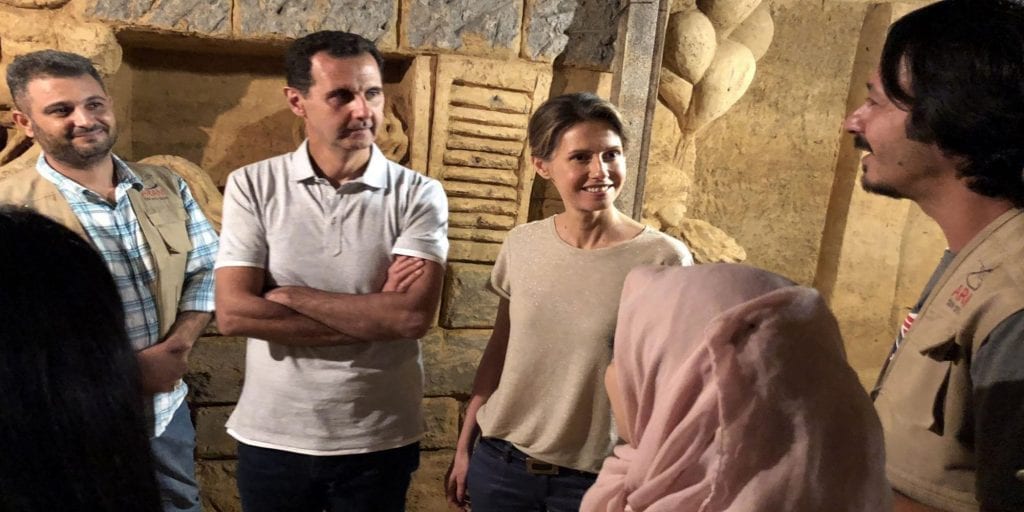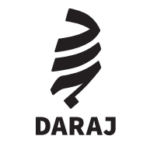This was the first time Syrians watched the Syrian businessman and the cousin of the Syrian president Bashar al-Assad, Rami Makhlouf, speak in front of a camera in a video.
The scene seemed strange and rare, especially since all the world has known of this influential billionaire before this moment were a few photos, published on Google by Makhlouf’s inner circle to be used by media outlets that serve his interests, or those owned by him in the first place.
Makhlouf―a wealthy man who has been punished by all kinds of international sanctions―appeared as your average, simple man; dressed in grey, lounging on the ground, with wood, possibly for a fireplace, in the background of his shot, addressing the camera in an emotional tone that was different from the one the media uses when speaking about this “economy tycoon”, whose name is on most international sanctions lists.
The video lasted for 15 minutes, in which Mr. Makhlouf uttered some easily understood phrases, as well as other incomprehensible ones, threatening to deal with the matter as a “personal battle” and drag it through the courts. He also appealed to his relative Bashar al-Assad to re-address the situation.
Mr. Makhlouf’s media appearance came days after the governmental news agency, (SANA) published some news claiming that: “The Syrian Telecom Regulatory Authority (SyTRA), warned the two telecommunications companies; “Syriatel”, which is owned by Mr. Makhlouf and “MTN” in which Makhlouf holds the largest share, that it is necessary to pay their treasury dues under the umbrella of “initiating legal proceedings”. These taxes amount―according to (SANA)―to 233.8 billion SYP (which is equivalent to 233 million dollars).
Although Makhlouf appeared emotional, he threatened several times to expose “files and documents” that he did not name, which indicates that he may have documents related to the financial chamber of the presidential palace, which could be used as leverage, and that will undermine the interests of Bashar al-Assad, if exposed.
More than a Tax Problem
Over the past 20 years, Makhlouf has never hesitated to pay any taxes or any obligations that he had, because he considered the taxes a form of “returning the favor” to his cousin, the president, who granted him unlimited authority and helped him invest in whatever he wanted in the country without any supervision or auditing.
On the other hand however, the value of the taxes of the network provider “Syriatel” is about 14% of the value of their profits―according to the Syrian tax code―which is less than the taxes that are paid by any owner of a micro-personal corporation.
This is the reason that Syrian researcher and economist, Younis al-Kareem, attributed to the fact that Syria’s tax code favors big investors and thus why Rami Makhlouf, who during his journey used to pay for his purchases, taxes and fulfill his obligations, except for during mega investments such as Syria’s International University that he bought without paying a penny, never faced a problem.
However even if the tax issue was more specific that that, Mr. Makhlouf would not have acted so strangely on social media platforms, and would not have threatened anyone, had he not had any wild card to use against the Syrian regime.
Mr. al-Kareem sees Mr. Makhlouf’s appearance on social media platforms as an intention to declare “war” if anyone stood in the way of his investments and businesses.
Through the video, Mr. Makhlouf repeated a threat involving “showing files and documents to relevant authorities” so he would emerge as the rightful side in this skirmish, after the files are released―without explaining what these documents include. Furthermore, he repeatedly threatened to go to court and spoke of his charitable roles and the roles of “Al-Bustan Association (ABA)” in supporting the Syrian pro-regime environment with millions of dollars, including with “charity work”. Moreover, he said that he pays at least 10 billion SYP in taxes annually, and that in 2019 he paid 12 billion SYP taxes for his companies.

Milestones in Both Asma Al-Assad and Rami Makhlouf’s Paths
Rami Makhlouf had inherited his father’s―Muhammad Makhlouf―trade, who was an influential businessman under Hafez al-Assad’s wing, and began his career path with the smuggling of cigarettes, foodstuffs and electrical appliances, according to the website “Pro Justice” created by “Amnesty International”.
Makhlouf then became the owner of a chain of businesses in fields such as, tourism, industry, hotels, media, and more. In addition to “Syriatel” and “MTN”, Makhlouf owns the local daily newspaper Al-Watan (The Homeland), along with Ninar FM, RAMAK Group, hotels, private universities, factories, and duty-free shops in all land and air checkpoints across the country.
At the beginning of Bashar al-Assad’s presidency, and his marriage to Asma al-Akhras, there was a harmony of interests between Makhlouf and Al-Akhras, Assad’s wife. Makhlouf was one of the most prominent businessmen who supported her, as he helped her manage a qualitative shift in Bashar al-Assad’s investments. Moreover, he helped her enter the European market with full force.
But the beginning of discord between the two sides emerged in September 2015 when Russia announced that it would intervene directly in the Syrian war, and shortly after the Russian forces occupied the Hmeimim military base.
“When the Russians entered the country, Asma al-Assad pressured her husband to give them sovereign investments,” al-Kareem added, “but the Iranians had already preceded the Russians to the battlefields in Syria at the time, yet most of the investments they could acquire were the ‘leftovers’ of Gulf and Turkish investments, as these countries had withdrawn because of their position on Bashar al-Assad at the beginning of the revolution.”
Since then, Iran has not been given any sovereign investment, while the Russians have taken control over the ports, phosphate and gas fields, water resources and other sovereign installations.
Al-Kareem explained that the Russians and Iranians had created allegiances among Syrian businessmen, to assert their presence, so the country became divided into four sectors.
The first sector is Asma al-Assad’s allies, including merchants, technocrats and warlords, while the second sector includes the “old economic guard”, a group of old bourgeois investors in Syria, the most prominent of whom is Rami Makhlouf, in addition to a pro-Russian stream and a pro-Iranian stream.
In 2018, Hazem Karfoul was appointed governor of the Central Bank of Syria. The first thing he did was issue a set of decisions that favored the warlords (Asma al-Assad’s stream) at the expense of the old Syrian investors (Rami Makhlouf’s stream). During that period, state institutions were collapsing and falling into the hands of the Russians, through long-term contracts, which made the Assad regime seem weak, whether in the eyes of Makhlouf or other investors, as they perceived that the institutions that gave legitimacy to this regime have become in the hands of the Russians, which led to the withdrawal of power and legitimacy from the Assad.
By the end of 2019, the institutions related to Rami Makhlouf began to face pressures, including the Al-Bustan charity foundation, owned by Samer Darwish, one of Makhlouf’s arms and strong weapons, who was interrogated by the security of the presidential (republican) palace in Syria.
A Warning
It seems that this buildup and conflicts of interests between Asma al-Assad and Rami Makhlouf led the latter to go out and send a direct warning to the Syrian president, Bashar Al-Assad.
Although Makhlouf appeared emotional, he threatened several times to expose “files and documents” that he did not name, which indicates that he may have documents related to the financial chamber of the presidential palace, which could be used as leverage, and that will undermine the interests of Bashar al-Assad, if exposed.
Moreover, Syriatel, owned by Makhlouf has 11 million users, and therefore huge amounts of cash flow, which means that it has a lot more cash than the government banks at the moment.
Al-Kareem thinks that Syriatel can withhold funds from state institutions and disturb the circulation of currency, especially the banknotes that the Syrian regime cannot print, such as 500 – 1000 – 2000 pounds, which may enable Syriatel to hinder the trade process in Syria totally.






